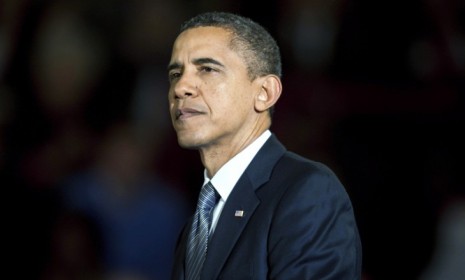Obama's new 'Teddy Roosevelt' populism: Will it help in 2012?
The president tries to find his voice by channeling the progressive politics of an early 20th century GOP president

A free daily email with the biggest news stories of the day – and the best features from TheWeek.com
You are now subscribed
Your newsletter sign-up was successful
On Tuesday, President Obama issued a rousing call for a stronger government role in protecting the middle class, and a stinging rebuke of GOP-backed "trickle-down economics." The location of the speech — Osawatomie, Kan. — was no accident. In 1910, Teddy Roosevelt used a famous speech there to demand a "square deal" for average Americans and promote a "New Nationalism" that became the framework for the progressive era. Channeling Teddy and Occupy Wall Street, Obama made a moral and economic case for tackling America's rising wealth disparity. Will emulating TR's populist message help Obama win re-election?
This was an inspired choice: Apparently, Obama is "a Teddy Roosevelt nerd" just like me, says John Avlon at CNN. So surely, "the irony that a Republican president defined the progressive era is not lost" on him. In fact, it's an association Obama is "courting directly in a bid to broaden the appeal of his 2012 agenda beyond partisan lines." Roosevelt is a hero to "Republicans, Democrats, and especially independents," and invoking his ghost lets Obama cleverly "strike populist tones and sound less like a liberal social democrat."
"Why Obama is listening to Teddy Roosevelt for 2012"
The Week
Escape your echo chamber. Get the facts behind the news, plus analysis from multiple perspectives.

Sign up for The Week's Free Newsletters
From our morning news briefing to a weekly Good News Newsletter, get the best of The Week delivered directly to your inbox.
From our morning news briefing to a weekly Good News Newsletter, get the best of The Week delivered directly to your inbox.
But Teddy lost: The trouble with the Osawatomie symbolism, at least for Obama, "is that Roosevelt, promoting those ideas, went on to lose his bid to return to the White House in 1912," says Ken Walsh at U.S. News. Instead of leading a progressive revolution, TR went down "amid charges that he was a demagogue who favored a vast over-reach in federal power." That makes this venue choice a "bad omen for Obama."
"Teddy Roosevelt a bad omen for Obama?"
Regardless, this is helping Obama find his voice: Wisely, Obama wasn't directly comparing himself to "one of America's truly great presidents," says John Cassidy at The New Yorker. He merely used Roosevelt's speech as "a convenient framing device" to lay out his own refreshingly "strong and cogent" defense of the middle class, and a devastating critique of today's GOP. Just in time for 2012, Obama "found his voice, or Teddy Roosevelt's voice," and "it was a big improvement."
"Invoking Teddy Roosevelt, Obama finds his voice"
A free daily email with the biggest news stories of the day – and the best features from TheWeek.com
C'mon. This vision is dated — and destructive: Obama has already absurdly claimed the mantles of "Lincoln, FDR, and Reagan," says Michael Knox Beran at National Review. But Teddy Roosevelt is actually pretty apt, since both he and Obama fought for more government. Obama, though, is "out of step with the time." In 1910, "government spending amounted to about 8 percent of GDP." Now it's 40 percent, and "the dead hand of Big Statism is destroying the economies of the West."
-
 Quiz of The Week: 7 – 13 February
Quiz of The Week: 7 – 13 FebruaryQuiz Have you been paying attention to The Week’s news?
-
 Nordic combined: the Winter Olympics sport that bars women
Nordic combined: the Winter Olympics sport that bars womenIn The Spotlight Female athletes excluded from participation in demanding double-discipline events at Milano-Cortina
-
 Samurai: a ‘blockbuster’ display of Japanese heritage
Samurai: a ‘blockbuster’ display of Japanese heritageThe Week Recommends British Museum show offers a ‘scintillating journey’ through ‘a world of gore, power and artistic beauty’
-
 The billionaires’ wealth tax: a catastrophe for California?
The billionaires’ wealth tax: a catastrophe for California?Talking Point Peter Thiel and Larry Page preparing to change state residency
-
 Bari Weiss’ ‘60 Minutes’ scandal is about more than one report
Bari Weiss’ ‘60 Minutes’ scandal is about more than one reportIN THE SPOTLIGHT By blocking an approved segment on a controversial prison holding US deportees in El Salvador, the editor-in-chief of CBS News has become the main story
-
 Has Zohran Mamdani shown the Democrats how to win again?
Has Zohran Mamdani shown the Democrats how to win again?Today’s Big Question New York City mayoral election touted as victory for left-wing populists but moderate centrist wins elsewhere present more complex path for Democratic Party
-
 Millions turn out for anti-Trump ‘No Kings’ rallies
Millions turn out for anti-Trump ‘No Kings’ ralliesSpeed Read An estimated 7 million people participated, 2 million more than at the first ‘No Kings’ protest in June
-
 Ghislaine Maxwell: angling for a Trump pardon
Ghislaine Maxwell: angling for a Trump pardonTalking Point Convicted sex trafficker's testimony could shed new light on president's links to Jeffrey Epstein
-
 The last words and final moments of 40 presidents
The last words and final moments of 40 presidentsThe Explainer Some are eloquent quotes worthy of the holders of the highest office in the nation, and others... aren't
-
 The JFK files: the truth at last?
The JFK files: the truth at last?In The Spotlight More than 64,000 previously classified documents relating the 1963 assassination of John F. Kennedy have been released by the Trump administration
-
 'Seriously, not literally': how should the world take Donald Trump?
'Seriously, not literally': how should the world take Donald Trump?Today's big question White House rhetoric and reality look likely to become increasingly blurred